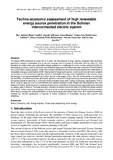Techno-economic assessment of high renewable energy source penetration in the Bolivian interconnected electric system
Fecha
2018Autor
Versión
Acceso abierto / Sarbide irekia
Tipo
Contribución a congreso / Biltzarrerako ekarpena
Versión
Versión publicada / Argitaratu den bertsioa
Impacto
|
|
nodoi-noplumx
|
Resumen
To reduce GHG emissions to reach the 2°C level, the International Energy Agency, projected that electricity generation based in renewable source should increase from 3% today to more than 20% by 2040 [1]. This transition to carbon-free and sustainable energy systems is a challenge for every country and particularly for developing countries. Lack of economic and technical resources has historicall ...
[++]
To reduce GHG emissions to reach the 2°C level, the International Energy Agency, projected that electricity generation based in renewable source should increase from 3% today to more than 20% by 2040 [1]. This transition to carbon-free and sustainable energy systems is a challenge for every country and particularly for developing countries. Lack of economic and technical resources has historically been a barrier for the transition into a low-carbon energy system. Under this context, the Bolivian government plans significant investments in renewable energy projects before 2025. Deployment of large hydro-power, small-scale wind and solar projects are foreseen in the investment agenda. However and despite the large solar capabilities of the country, solar technology is not yet considered to be a main source in the supply chain. The aim of this article is to evaluate the flexibility of the Bolivian power generation system in terms of energy balancing, electricity generation costs and power plants scheduling in a scenario that considers large solar energy technology deployment. This is done using an open source unit commitment and optimal dispatch model (Dispa-Set) developed by the Joint Research Center. National data for existing infrastructure, committed and planned energy projects are inserted to assess case of Bolivia. The base scenario consider all techno-economic data of the Bolivian power system up to 2016. Further scenarios investigate different levels of solar energy deployment. Results from the analysis show that an energy mix with participation of solar technology with values lower than 30 % seems technically feasible but thermal generation is required to follow variations of renewable sources and prevent load shedding. [--]
Materias
Bolivia,
Electricity cost,
Energy balance,
Power plant dispatching,
Solar energy
Editor
University of Minho
Publicado en
ECOS 2018: Proceedings of the 31st International Conference on Efficiency, Cost, Optimization, Simulation and Environmental Impact of Energy Systems. Guimarães, Portugal, 2018
Departamento
Universidad Pública de Navarra. Departamento de Ingeniería Eléctrica, Electrónica y de Comunicación /
Nafarroako Unibertsitate Publikoa. Ingeniaritza Elektrikoa, Elektronikoa eta Telekomunikazio Ingeniaritza Saila




